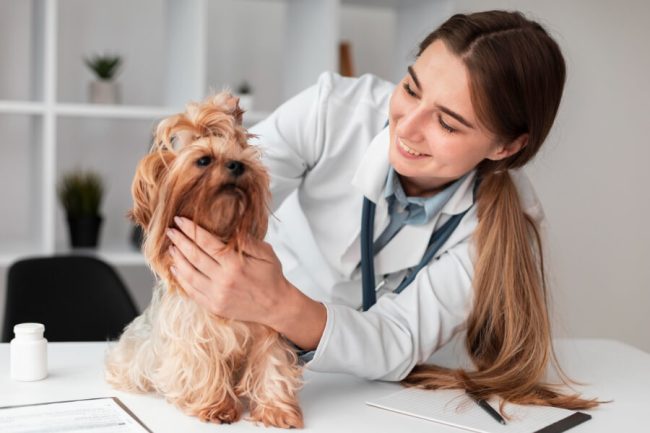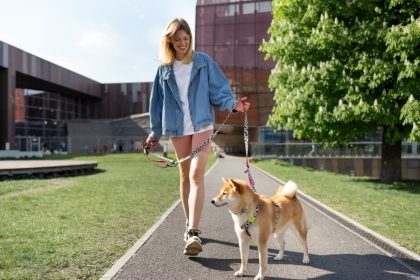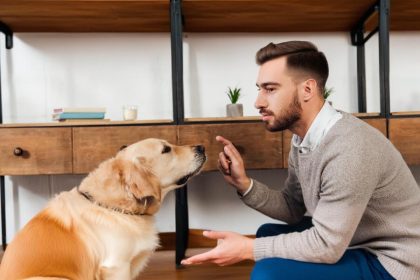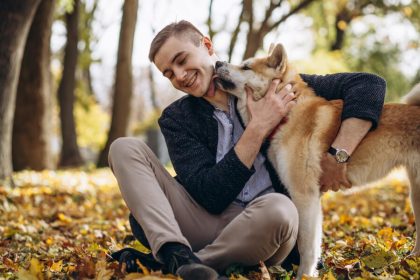If your furry friend seems nervous, overly stressed, or restless, they may be suffering from dog anxiety. Just like humans, dogs can experience anxiety due to various factors, whether it’s separation from their owners, loud noises, or unfamiliar surroundings.
The good news is there are numerous ways to help ease their discomfort and calm their nerves. Here are 7 remedies that you can try to reduce your dog’s anxiety, helping them live a more relaxed and happy life.
Dog Anxiety Symptoms
Recognizing the signs of dogs’ anxiety is important for early intervention. Common symptoms include:
- Excessive barking or whining
- Destructive behaviors (chewing, digging)
- Restlessness or pacing
- Trembling or shaking
- Hiding or trying to escape
- Licking or chewing paws
- Loss of appetite
Identifying these symptoms is the first step in addressing dogs’ anxiety.
Common Causes of Anxiety in Dogs
There are many potential triggers for dog anxiety, and understanding these causes is the first step toward providing relief. Some common sources include:
- Separation Anxiety: Dogs often become anxious when left alone for extended periods.
- Loud Noises: Thunderstorms, fireworks, or even household appliances can cause distress.
- New Environments or People: Changes in the dog’s routine, environment, or new visitors can trigger anxiety.
- Trauma: Rescue dogs or those with a history of abuse are more prone to dog anxiety.
Each dog is unique, so pinpointing the specific cause will help you find the most effective remedy.
Effects of Anxiety on Dogs’ Behavior and Health
Long periods of dog’s anxiety can have lasting effects on their behavior and physical health. It can lead to:
- Weakened immune systems
- Digestive problems
- Aggressive behaviors
- Sleep disturbances
Addressing dog anxiety is not only about ensuring your pet’s happiness but also protecting their long-term health.
Home Remedies for Dog Anxiety
Physical Exercise and Mental Stimulation
A tired dog is a happy dog! Regular exercise is one of the best remedies for dog anxiety. Physical activity helps release pent-up energy and lowers stress levels.
In addition to daily walks or runs, mental stimulation such as puzzle toys can keep your dog focused and distracted from anxiety triggers.
- Pro Tip: Create a routine with consistent exercise and playtime to prevent stress from building up.
Aromatherapy and Essential Oils
Aromatherapy can have a calming effect on anxious dogs. Essential oils like:
- Lavender
- Chamomile
- Frankincense
These are known for their relaxing properties. These can be diffused in the room or used in a dog-safe spray.
Calming Music and Sound Therapy
Sound therapy is another excellent way to soothe an anxious dog. Soft classical music or specialized tracks for dogs can lower anxiety levels, particularly during loud events like thunderstorms or fireworks.
- Try This: Play calming music at a low volume when you know your dog will be exposed to stressful situations.
Herbal Remedies for Dog Anxiety
Natural herbs like:
- Valerian root
- Passionflower
- Chamomile
These can be effective in managing dog anxiety. These herbs have calming properties and are available in supplements made specifically for pets.
Creating a Safe Space for Your Dog
Having a designated safe space can make a huge difference in reducing dog anxiety. This area should be quiet, comfortable, and free from stress triggers. Equip the space with their favorite toys, blankets, and maybe even a calming pheromone diffuser to make it extra cozy.
- Create a Comfort Zone: Ensure this safe space is always accessible when your dog feels anxious, such as during loud noises or when left alone.
Thundershirt or Anxiety Wrap
One effective and widely used remedy for dog anxiety is the Thundershirt or an anxiety wrap.
These snug-fitting garments apply gentle, constant pressure on your dog’s body, which can help reduce stress and anxiety, especially during thunderstorms or travel.
- How It Works: The pressure mimics a comforting hug, which can help calm your dog down during stressful situations.
- When to Use: Consider using it during thunderstorms, car rides, fireworks, or any situation where your dog might feel anxious.
The Thundershirt is a natural and non-invasive solution, providing immediate comfort for many dogs who experience dog anxiety.
Is CBD good for dog anxiety?
CBD oil has gained popularity as a natural remedy for managing anxiety in dogs.
It is derived from the cannabis plant but doesn’t contain THC (the psychoactive component), making it safe for pets.
CBD oil can help calm dogs, reduce anxiety, and promote relaxation.
- Benefits: CBD oil can reduce stress, ease pain, and improve your dog’s overall sense of calm.
- Dosage and Safety: Always consult your veterinarian before giving your dog CBD oil to ensure it’s safe and to determine the appropriate dosage.
CBD oil is an increasingly popular remedy for dog anxiety, offering a natural, gentle solution for stress relief.
Professional Solutions for Dog Anxiety
Consulting a Veterinarian or Animal Behaviorist
If home remedies are not sufficient, it’s a good idea to consult a veterinarian or a certified animal behaviorist.
They can assess the severity of dog anxiety and provide a tailored treatment plan that may include behavior therapy or medication.
- Expert Advice: A vet may recommend prescription medications or natural supplements to help manage dog anxiety.
Behavior Modification Techniques
Behavior modification is a powerful tool for addressing dog anxiety. Techniques like desensitization and counter-conditioning gradually expose your dog to anxiety triggers while reinforcing positive behavior.
- Patience is Key: This method takes time and consistency but can help reduce long-term anxiety.
Prescription Medications for Severe Cases
In some cases, your vet may prescribe medications to help manage severe dog anxiety. These are often used for short-term situations, such as before a long car ride or when fireworks are expected.
- Talk to Your Vet: Medication should always be a last resort, and its use should be monitored closely by a professional.
Alternative Therapies like Acupuncture or Massage
Acupuncture and massage therapy are growing in popularity as alternative treatments for dog anxiety. Both methods work by promoting relaxation and releasing tension from your dog’s body.
- Explore Holistic Options: Many pet owners have seen positive results with these therapies, especially for dogs with chronic anxiety.
Additional Tips for Managing Dog Anxiety
Consistent Routine and Positive Reinforcement
Dogs thrive on consistency. Establishing a regular daily routine for meals, walks, and playtime helps reduce dog anxiety by providing a sense of security. Always use positive reinforcement to reward calm behavior.
Training and Socialization for Anxious Dogs
Gradual socialization with new people, pets, and environments can help reduce dog anxiety. Start slow and increase exposure to new situations, always rewarding calm behavior.
Triggers and Stressful Situations
Identifying what causes your dog’s anxiety is essential to managing it effectively. Once you know the triggers whether it’s loud noises, car rides, or separation try to minimize exposure to those stressors.
Conclusion
Dog anxiety can be a challenging issue for both pets and their owners, but there are plenty of remedies that can help. Whether you choose natural solutions like aromatherapy, or herbal supplements, or seek professional guidance, these 7 remedies can bring much-needed relief to your furry friend.
Remember, every dog is different, so finding the right combination of treatments might take time. Be patient, and always consult your veterinarian if you’re unsure about the best approach for your dog’s anxiety.
FAQs
How to calm a nervous dog at home?
To calm a nervous dog, try using calming music, aromatherapy, or creating a safe, quiet space where they can relax.
What is the best natural remedy for dog anxiety?
Some of the best natural remedies for dog anxiety include lavender essential oil, valerian root, and regular physical exercise.
Can you train anxiety out of a dog?
Yes, behavior modification techniques like desensitization and counter-conditioning can help manage dog anxiety over time.
Do herbal remedies work on dogs?
Herbal remedies can be beneficial for dogs, addressing issues like anxiety and inflammation. Always consult a veterinarian to ensure safety and effectiveness.







